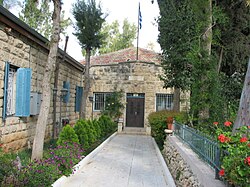History
Classic period
In the late 330s BCE, Alexander the Great invaded the Middle East (including the area which is now Israel), during his campaigns against the Achaemenid Empire. The landscape during this period was markedly changed by extensive growth and development that included urban planning and the establishment of well-built fortified cities. Hellenistic pottery, trade and commerce flourished, particularly in the most Hellenized areas, such as Ashkelon, Jaffa, Jerusalem, Gaza, and ancient Nablus (Tell Balatah). [2]
When the Hasmonean Kingdom was absorbed into the Roman Empire, the area remained under the influence of the Greek language and culture. Especially during the Byzantine period, Palaestina reached its greatest prosperity in antiquity. Urbanization increased, large new areas were put under cultivation, monasteries proliferated and synagogues were restored. The cities of Palaestina Prima and Teria, such as Caesarea Maritima, Jerusalem, Scythopolis, Neapolis, and Gaza reached their peak population, and the population west of the Jordan may have reached as many as one million.
Modern era
The 1922 census of Palestine lists 1,315 Greek speakers in Mandatory Palestine (7 in Southern, 1,044 in Jerusalem-Jaffa, 19 in Samaria, and 245 in Northern), including 1,230 in municipal areas (760 in Jerusalem, 161 in Jaffa, 205 in Haifa, 4 in Gaza, 1 in Hebron, 6 in Nablus, 1 in Safad, 1 in Lydda, 12 in Nazareth, 20 in Ramleh, 1 in Tiberias, 29 in Bethlehem, 11 in Acre, 2 in Tulkarem, 1 in Ramallah, 4 in Beit Jala, 10 in Jenin, 1 in Beersheba, and 1 in Baisan). [4]
During the WWII some of the Greek community went to Greece voluntarily to fight against the Axis powers. [5]
This page is based on this
Wikipedia article Text is available under the
CC BY-SA 4.0 license; additional terms may apply.
Images, videos and audio are available under their respective licenses.

